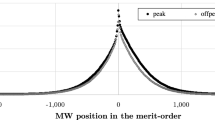Abstract
The goal of this paper is to compare results for discriminatory auctions to results for uniform-price auctions when suppliers have capacity constraints. We have a pretty good understanding of what equilibrium results look like for the uniform-price auctions. But an unresolved problem is what happens when a discriminative auction is run and suppliers have capacity constraints. We formulate a supply function equilibrium model in continuous offer schedules with inelastic time-varying demand and with single-step marginal cost function to compare two auction institutions in the presence of capacity constraints. We show that payments made to the suppliers in the unique equilibrium of the discriminatory auction can be less than the payments in the uniform-price auction, depending on which uniform-price auction equilibrium is selected. For the high demand and/or low excess capacity cases, we characterize also mixed strategy supply function equilibrium under the discriminatory auction.
Similar content being viewed by others
References
Fabra, N., von der Fehr, N., Harbord, D.: Designing electricity auctions. Rand J. Econ. 37(1), 23–46 (2006)
Federico, G., Rahman, D.: Bidding in an electricity pay-as-bid auction. J. Regul. Econ. 24(2), 175–211 (2003)
Rassenti, S., Smith, V., Wilson, B.: Discriminatory price auctions in electricity markets: low volatility at the expense of high price levels. J. Regul. Econ. 23, 109–123 (2003)
Fabra, N.: Tacit collusion in repeated auctions: uniform versus discriminatory. J. Ind. Econ. 51(3), 271–293 (2003)
Holmberg, P.: Comparing supply function equilibria of pay-as-bid and uniform-price auctions. PhD thesis, Chap. 4, Uppsala University, Economics Department (2005)
Son, Y.S., Baldick, R., Lee, K.H., Siddiqi, S.: Short-term electricity market auction game analysis: uniform and pay-as-bid pricing. IEEE Trans. Power Syst. 19(4), 1990–1998 (2004)
Wolfram, C.: Strategic bidding in a multiunit auction: an empirical analysis of bids to supply electricity in England and Wales. Rand J. Econ. 29, 703–725 (1998)
Hortacsu, A., Puller, S.L.: Testing strategic models of firm behavior in electricity markets: a case study of ERCOT. NBER Working Paper #11116 (2006)
Genc, T., Reynolds, S.: Supply function equilibria with pivotal electricity suppliers. Working Paper No. 04-10, University of Arizona Economics Department, March (2004)
Wolfram, C.: Electricity markets: should the rest of the world adopt the United Kingdom’s reforms? Regulation 22(4), 48–53 (1999)
Kahn, A.E., Cramton, P.C., Porter, R.H., Tabors, R.D.: Uniform pricing or pay-as-bid pricing: a dilemma for California and beyond. Electr. J. 70–79 (2001)
Evans, J., Green, R.: Why did British electricity prices fall after 1998? Cambridge Working Papers CWPE 0326 (2003)
Bower, J.: Why did electricity prices fall in England and Wales? Market mechanism or market structure. Oxford Institute for Energy Studies publication (2002)
Newbery, D.M.: What Europe can learn from British privatisations. Econ. Pubblica XXXIII(2), 63–76 (2003)
Anwar, A.W.: The case for a discriminatory pricing rule in competitive electricity pools. Mimeo, Department of Economics, Edinburgh University (1999)
Baldick, R., Hogan, W.: Capacity constraint supply function equilibrium models of electricity markets: stability, non-decreasing constraints, and function space iteration. PWP-089 Working Paper, University of California Berkeley, August (2002)
Day, C.J., Hobbs, B.F., Pang, J.S.: Oligopolistic competition in power networks: a conjectured supply function approach. IEEE Trans. Power Syst. 15, 638–645 (2000)
Anderson, E.J., Philpott, A.B.: Using supply functions for offering generation into an electricity market. Oper. Res. 50, 477–489 (2002)
Klemperer, P., Meyer, M.: Supply function equilibria in oligopoly under uncertainty. Econometrica 57(6), 1243–1277 (1989)
Back, K., Zender, J.: Auctions of divisible goods: on the rationale for the treasury experiment. Rev. Financ. Stud. 6, 733–764 (1993)
Wang, J., Zender, J.: Auctioning divisible goods. Econ. Theory 19, 673–705 (2002)
Anderson, E.J., Xu, H.: Supply function equilibrium in electricity spot markets with contracts and price caps. J. Optim. Theory Appl. 124(2), 257–283 (2005)
Newbery, D.M.: Competition, contracts and entry in the electricity spot market. Rand J. Econ. 29, 726–749 (1998)
Rudkevich, A.: Supply function equilibrium: theory and applications. In: Proceedings of the 36th Hawaii International Conference on System Sciences (2003)
Author information
Authors and Affiliations
Corresponding author
Additional information
Communicated by M.A. Simaan.
The author is grateful to Stanley S. Reynolds for helpful discussions and suggestions improving the manuscript. He thanks the Associate Editor and the anonymous referees for constructive remarks. He also thanks Bram Cadsby and the participants in the seminars at University of Toronto and HEC-Montreal for useful comments. This work was supported by the Social Sciences and Humanities Research Council of Canada.
Rights and permissions
About this article
Cite this article
Genc, T.S. Discriminatory Versus Uniform-Price Electricity Auctions with Supply Function Equilibrium. J Optim Theory Appl 140, 9–31 (2009). https://doi.org/10.1007/s10957-008-9437-8
Published:
Issue Date:
DOI: https://doi.org/10.1007/s10957-008-9437-8




